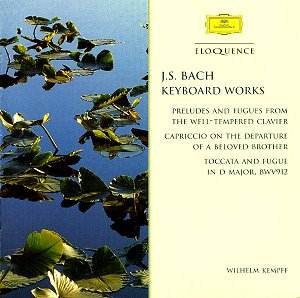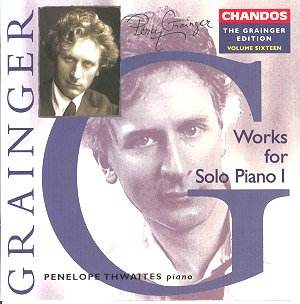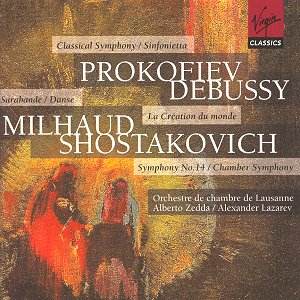 Composer: Richard Stoker
Composer: Richard Stoker
Works: Piano Serenade Op. 17 (1962), Piano Sonata No. 1 Op. 26 (1967), A Poet’s Notebook Op. 19 (1969), Piano Variations Op. 45 (1973), Regency Suite Op. 15 (1952-1959), Two Jazz Preludes Op. 63 (1980), Zodiac Variations Op. 22 (1965), Piano Sonata No. 2 Op. 71 (1992)
Performers: Eric Parkin, piano
Recording: Priory PRCD 659, recorded 1998
Label: Priory Records
Richard Stoker, a composer whose works span nearly seven decades, emerges as an intriguing figure in the landscape of British music. His piano music, as showcased in this recording by Eric Parkin, reveals a rich tapestry of influences and styles, demonstrating a familiarity with both the classical tradition and the modern idiom. The works included on this disc encapsulate Stoker’s evolution as a composer, from the early Regency Suite to the mature Piano Sonata No. 2, each piece reflective of his distinctive voice and diverse experiences.
Parkin’s interpretations of Stoker’s works are notable for their clarity and sensitivity. In the Piano Serenade Op. 17, he deftly navigates the five short movements, highlighting the work’s lyrical qualities. The opening ‘Prelude’ showcases Stoker’s affinity for melodic lines reminiscent of Berkeley and Poulenc, as Parkin articulates the delicate interplay between the notes with a graceful touch. The ‘Intermezzo’ stands out as a contemplative centerpiece; here, Parkin’s nuanced dynamics and subtle phrasing bring forth its introspective nature, allowing the listener to appreciate Stoker’s craftsmanship. The engineering of this recording supports the performance beautifully, capturing the piano’s tonal richness without overpowering the more delicate passages.
The Piano Sonata No. 1 Op. 26 presents a different challenge, with its modernist leanings and two-movement structure. Parkin’s execution is both bold and reflective, particularly in the first movement, where he balances the impressionistic textures with a sense of direction. The second movement’s Passacaglia unfolds with a meditative quality, and Parkin’s attention to detail in its development reveals Stoker’s sophisticated approach to form. The contrast between the two movements is handled with deftness, placing Stoker’s stylistic evolution in clear relief.
In A Poet’s Notebook Op. 19, the six miniature sketches are executed with a sense of whimsy that captures the essence of Stoker’s artistic breadth. Parkin’s performance emphasizes the playful nature of the ‘Lampoon,’ employing crisp articulation and rhythmic vitality, while the ‘Elegy’ showcases a poignant lyricism that resonates deeply. The brevity of these pieces, akin to Prokofiev’s Visions Fugitives, invites Parkin to engage with each sketch as a snapshot of creativity, allowing the listener to experience a fleeting glimpse into Stoker’s world.
Stoker’s Piano Variations Op. 45, while more challenging in its exploration of sound, is effectively brought to life by Parkin’s technical prowess. The variations exhibit a range of textures and moods, and Parkin navigates the intricacies with a commendable intensity. However, the thematic material feels somewhat tenuous, making the piece less immediately engaging. This work serves as a contrast to the more melodic and lyrical elements present in the earlier compositions, showcasing Stoker’s willingness to experiment with form and sound.
The Regency Suite Op. 15 is a delightful amalgamation of Stoker’s early influences, blending youthful exuberance with a playful sophistication. Parkin’s interpretation of the ‘Scherzo’ captures its lively character, while the ‘Pastoral Andante’ evokes a sense of desolation that speaks to Stoker’s early inspiration from the Yorkshire landscape. The engineering here is particularly effective, allowing the piano’s tonal colors to shine through the varied textures of the suite.
The Two Jazz Preludes Op. 63 demonstrate Stoker’s ability to incorporate jazz idioms into his classical framework. Parkin’s performance is particularly notable for its relaxed yet precise execution, which imbues the pieces with an atmospheric quality that transports the listener to a late-night jazz club. In juxtaposition, the Zodiac Variations Op. 22 reveal a more conventional structure with a playful exploration of onomatopoeic effects, all of which Parkin handles with agility and flair.
Stoker’s Piano Sonata No. 2 Op. 71, a masterwork of the collection, showcases his mature style and complexity. Parkin’s interpretation is passionate and engaging, particularly in the first movement, where he navigates the intricate textures with remarkable fluidity. The use of jazz elements within a classical context is handled with sophistication, resulting in a work that feels both contemporary and rooted in tradition.
The recording quality throughout is exemplary, with Priory Records capturing the nuances of Parkin’s playing and Stoker’s intricate compositions effectively. Each piece is afforded the space it requires, allowing for a clear delineation of themes and textures.
Stoker’s piano music, as presented in this recording, is a testament to his considerable talent and the depth of his compositional voice. Eric Parkin serves as an ideal interpreter, bringing both technical skill and interpretative insight to the works. This collection not only enriches the existing canon of British piano music but also invites further exploration into a composer whose contributions have been unjustly overlooked. The album stands as a compelling introduction to Richard Stoker, revealing the richness and variety of his artistic output.



